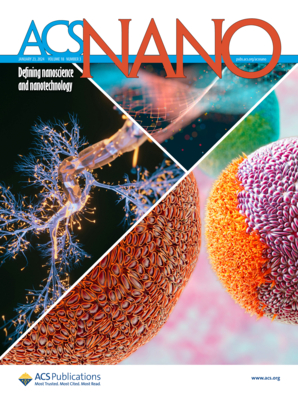为宽温硫化聚丙烯腈锂电池设计致密离子群电解质
IF 15.8
1区 材料科学
Q1 CHEMISTRY, MULTIDISCIPLINARY
引用次数: 0
摘要
电解质对锂硫电池(LSB)的发展起着至关重要的作用,因为它不仅能传输电荷载流子,还能广泛影响硫转换机制和电极表面形成的电极-电解质相间,从而直接影响电池性能。然而,现有的大多数电解质都存在与锂阳极或硫阴极不兼容的问题。在这里,我们通过将弱溶解性溶剂和惰性稀释剂巧妙地结合在一起,开发出了一种致密离子簇电解质(DPIE),从而在其结构中自组装出大量致密的离子对聚集体。这种奇特的溶解结构促进了 Li+ 的快速解溶,形成了坚固的电极-电解质相间层,并抑制了多硫化物的溶解。利用定制的 DPIE,室温锂硫化聚丙烯腈(SPAN)电池实现了 300 次稳定循环,容量保持率达 97.8%,库仑效率稳定在 99.9% 以上。即使在有限的负极/正极面积容量比为 4 的条件下,SPAN 锂电池也能在 250 次循环中表现出良好的稳定性,容量保持率高达 97.1%。此外,Li||SPAN 电池在-20 至 60 °C的宽温度范围内都表现出令人印象深刻的稳定性,并在-10 °C的温度下表现出超过 200 次循环的可逆性。这种电解质设计使 LSB 具有更长的工作寿命、快速充电能力和更高的温度耐受性。本文章由计算机程序翻译,如有差异,请以英文原文为准。

Engineering Densely Packed Ion-Cluster Electrolytes for Wide-Temperature Lithium–Sulfurized Polyacrylonitrile Batteries
The electrolyte plays an essential role in the advancement of lithium–sulfur batteries (LSBs), as it not only transports the charge carriers but also extensively influences sulfur conversion mechanisms and electrode–electrolyte interphases formed on the electrode surface, thereby directly impacting battery performance. However, the majority of existing electrolytes suffer from incompatibility with either the Li anode or the sulfur cathode. Here, we develop a densely packed ion-cluster electrolyte (DPIE) through the strategic combination of a weakly solvating solvent and an inert diluent, resulting in the self-assembly of abundant compact ion-pair aggregates within its structure. This peculiar solvation structure promotes fast Li+ desolvation, the formation of robust electrode–electrolyte interphases, and the suppression of polysulfide dissolution. Leveraging the tailored DPIE, room-temperature Li||sulfurized polyacrylonitrile (SPAN) batteries demonstrate 300 stable cycles with a capacity retention of 97.8% and a steady Coulombic efficiency exceeding 99.9%. Even under a limited negative/positive areal capacity ratio of four, the Li||SPAN cells exhibit good stability over 250 cycles with 97.1% capacity retention. Furthermore, Li||SPAN batteries show impressive stability over a wide temperature range spanning from −20 to 60 °C and exhibit reversibility at −10 °C over 200 cycles. This electrolyte design enables LSBs with prolonged operational lifetimes, rapid charging capabilities, and expanded temperature tolerance.
求助全文
通过发布文献求助,成功后即可免费获取论文全文。
去求助
来源期刊

ACS Nano
工程技术-材料科学:综合
CiteScore
26.00
自引率
4.10%
发文量
1627
审稿时长
1.7 months
期刊介绍:
ACS Nano, published monthly, serves as an international forum for comprehensive articles on nanoscience and nanotechnology research at the intersections of chemistry, biology, materials science, physics, and engineering. The journal fosters communication among scientists in these communities, facilitating collaboration, new research opportunities, and advancements through discoveries. ACS Nano covers synthesis, assembly, characterization, theory, and simulation of nanostructures, nanobiotechnology, nanofabrication, methods and tools for nanoscience and nanotechnology, and self- and directed-assembly. Alongside original research articles, it offers thorough reviews, perspectives on cutting-edge research, and discussions envisioning the future of nanoscience and nanotechnology.
 求助内容:
求助内容: 应助结果提醒方式:
应助结果提醒方式:


